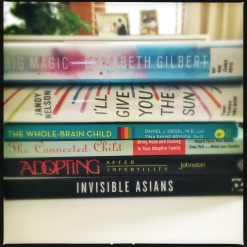
I have a photo album filled with pictures of my son from the day we first met him in Korea. The pictures include his foster mother and my husband and I playing and holding him. To be expected, we are all smiling and filled with incredible joy on this happy day. Lately, however, when my son looks at these same photos; it triggers both confusion and sadness.
This week was a particularly hard grieving week for my son. He usually enjoys looking at his photo album, but on this particular day when he looked at the picture of himself playing with his yellow toy bus, he was completely inconsolable. He ran to the door, pointed to my car, and cried omma (mommy). Even though I read all the books related to adoption and grieving and have first hand experience as a transracial adoptee, I still wasn’t prepared for this. I was taken completely off guard. How do you explain to a grieving two year old that he can’t get in the car and see his foster mother? Or explain how his life in Korea had to end so he could begin his new life with me. I stumbled through my words fighting back my tears and eventually managed to explain that it’s okay to be sad. I reassured him that one day he will fly in an airplane to visit his omma and play with his bus. Now every time he sees or hears an airplane he looks at me with a huge grin and confidently says omma.
During the first few months after my son joined my family, he loved to sit on the arm chair of the couch looking out the window in the porch and watch the cars and buses drive by. I used to think this was because he is obsessed with vehicles, but now I wonder if he sat there hoping and waiting for his omma to return. Some days he clearly misses Korea and has deep memories like when he insists on wearing his favorite shirt that smells like his foster mother or when he opens the refrigerator door, points to the jar of gochujang and says omma with a wide happy smile. My heart breaks every time he says her name and the only words of comfort I can say is that she can’t be here, but she still loves and cares for him.
I understand that because my son is adopted he will experience tremendous grief and loss throughout different stages of his life. As he gets older, his grief will change and our conversations will become much more complicated to navigate. But I also know that no matter how much I comfort him in his time of need, I can’t take away his grief. It will always be.







